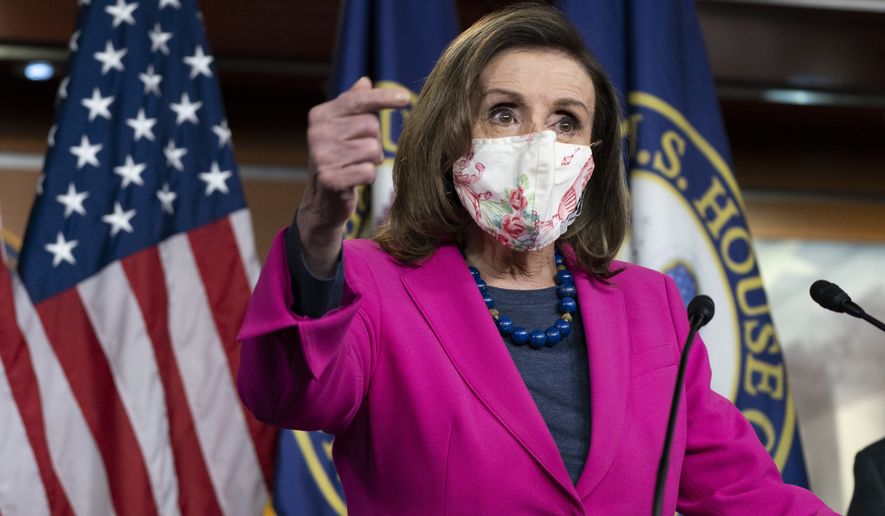House Speaker Nancy Pelosi narrowly secured passage of her signature election-overhaul legislation Wednesday without a single Republican vote, sending the heated debate over how America votes to the Senate where the bill is all-but doomed.
The proposal, which is known as H.R. 1, passed on a 220-210 vote almost entirely along party lines. Although one Democrat voted against the bill, the vote was otherwise entirely partisan, underscoring the gap between the two parties on election laws.
“Everything is at stake,” Mrs. Pelosi, California Democrat, said at a press conference ahead of the vote. “Across the country over 200 bills are being put together, provisions are put forth [by Republicans] to suppress the vote.”
“What we are doing in this fight that we are engaged in is to empower the people,” she said.
Initially, the measure was heralded by House Democrats as expanding voting rights. They argued that the legislation, titled the “For the People Act,” would curb the influence of money in politics, prevent foreign interference in campaigns and stymie voter suppression.
Republicans have pointed to the bevy of liberal provisions in the 791-page bill and decried it as a partisan effort intended only to benefit Democratic candidates. They also have balked at the bill for guaranteeing voting rights for all felons, granting statehood to the District of Columbia and providing public financing of campaigns.
Despite House passage, the bill faces an even steeper climb in the Senate, where it will need at least 10 Republican votes to survive an expected filibuster. That number of Republican defections is unfathomable given the united opposition among Republicans in the House.
Sen. Richard Blumenthal, Connecticut Democrat and a strong supporter of a campaign finance overhaul, gave a blunt assessment when asked if the bill would pass the upper chamber.
“As it is now, no,” he said, though he held out hope that it could pass with some unspecified changes.
Rep. Tom McClintock, California Republican, proclaimed that the legislation, if enacted, would kill democracy in the U.S. He cited language in the bill that “nationalizes the mass-mailing of ballots,” while loosening restrictions on who can vote and where.
“Democracies die when one party seizes control of the elections process, eliminates the safeguards that have protected the integrity of the ballot, places restrictions on free speech, and seizes the earnings of others to promote candidates they may abhor,” Mr. McClintock said. “That’s the bill before us today.”
Resistance to the measure was so widespread among Republicans that it temporarily closed the rift in the party over the 2020 presidential election.
In the aftermath of that race, former President Donald Trump and his allies cast doubts on the results of the election because of the widespread use of mail-in ballots and accusations of fraud. A faction of Republicans blamed those statements by Mr. Trump the Jan. 6 mob attack on Congress.
In Wednesday’s vote, House Republicans united around the election-integrity issue and allegations that H.R. 1 would damage the democratic system.
Both Rep. Liz Cheney of Wyoming, a leading anti-Trump Republican, and Rep. Marjorie Taylor Greene of Georgia, a fierce ally of the former president, voted against the measure.
In the lead-up to the vote, the bill also drew fire from the political left. The Green Party, which champions environmental and social-justice causes, accused Mrs. Pelosi of trying to “crush alternative” political parties.
Tony Ndege, the Green Party’s national co-chairman, urged Democrats to amend language that would raise the qualifying threshold for candidates to receive federal matching funds from $5,000 each to $25,000.
“How can they call this bill ‘For The People’ when they are silencing alternative parties at a time when more people than ever are demanding more political choice,” Mr. Ndege said.
• Haris Alic can be reached at halic@washingtontimes.com.




Please read our comment policy before commenting.